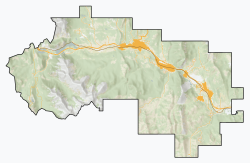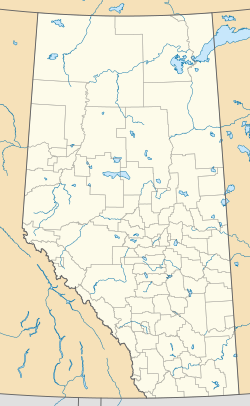Hillcrest, Alberta
Hillcrest | |
|---|---|
| Coordinates: 49°34′08″N 114°22′37″W / 49.569°N 114.377°W | |
| Country | Canada |
| Province | Alberta |
| Specialized municipality | Crowsnest Pass |
| Government | |
| • Type | Unincorporated |
| • Governing body | Municipality of Crowsnest Pass Council |
| Area (2021)[1] | |
| • Land | 0.51 km2 (0.20 sq mi) |
| Population (2021)[1] | |
• Total | 640 |
| • Density | 1,251.7/km2 (3,242/sq mi) |
| Time zone | UTC−7 (MST) |
| • Summer (DST) | UTC−6 (MDT) |
Hillcrest, also known as Hillcrest Mines, is an urban community in the Rocky Mountains within the Municipality of Crowsnest Pass in southwest Alberta, Canada. It was once a hamlet[2][3] under the jurisdiction of Improvement District (ID) No. 5 prior to 1979 when the former ID No. 5 amalgamated with four other municipalities to form Crowsnest Pass.
History
[edit]Hillcrest was named after Charles Plummer Hill, an early coal prospector and entrepreneur who also founded Porthill, Idaho. Hill grew up and was educated in Seaford, Delaware before moving northwest. The Hillcrest Coal and Coke Company, incorporated on January 31, 1905, began constructing the community the same year, and the Canadian Pacific Railway soon built a spur, for transporting coal from the Hillcrest Mine, and a train station. Hillcrest soon grew to a population of about 1,000. The post office opened in 1907 with Mr. Hill as the postmaster.[11]
Although the mine was successful, and considered one of the safest in the region, an underground explosion in 1914 (Canada's worst mine disaster) killed 189 people — almost twenty percent of the community's population and half the mine's workforce. A further explosion in 1926 killed two others. After the mine closed in 1939, Hillcrest experienced a period of economic decline.
In 1979, the former I.D. No. 5, which included the former hamlet of Hillcrest, amalgamated with Bellevue, Blairmore, Coleman and Frank to form the Municipality of Crowsnest Pass.
Demographics
[edit]In the 2021 Census of Population conducted by Statistics Canada, Hillcrest had a population of 640 living in 324 of its 373 total private dwellings, a change of 7.2% from its 2016 population of 597. With a land area of 0.51 km2 (0.20 sq mi), it had a population density of 1,254.9/km2 (3,250.2/sq mi) in 2021.[1]
See also
[edit]References
[edit]- ^ a b c d "Population and dwelling counts: Canada and designated places". Statistics Canada. February 9, 2022. Retrieved February 10, 2022.
- ^ Annual Report of the Dept. of Highways of the Province of Alberta. Alberta Department of Highways. 1958. p. 44 & 46. Retrieved October 11, 2013.
- ^ "Board Order: MGB 131/98" (PDF). Alberta Municipal Affairs. June 3, 1998. Archived from the original (PDF) on April 19, 2014. Retrieved August 28, 2012.
- ^ Ninth Census of Canada, 1951 (PDF). Vol. SP-7 (Population: Unincorporated villages and hamlets). Dominion Bureau of Statistics. March 31, 1954. pp. 55–57. Retrieved October 24, 2021.
- ^ Census of Canada, 1956 (PDF). Vol. Population of unincorporated villages and settlements. Dominion Bureau of Statistics. October 25, 1957. pp. 56–59. Retrieved October 24, 2021.
- ^ "Population of unincorporated places of 50 persons and over, Alberta, 1961 and 1956". 1961 Census of Canada: Population (PDF). Series SP: Unincorporated Villages. Vol. Bulletin SP—4. Ottawa: Dominion Bureau of Statistics. April 18, 1963. pp. 63–67. Retrieved October 24, 2021.
- ^ "Population of unincorporated places of 50 persons and over, 1966 and 1961 (Alberta)". Census of Canada 1966: Population (PDF). Special Bulletin: Unincorporated Places. Vol. Bulletin S–3. Ottawa: Dominion Bureau of Statistics. August 1968. pp. 184–187. Retrieved October 24, 2021.
- ^ "Population of Unincorporated Places of 50 persons and over, 1971 and 1966 (Alberta)". 1971 Census of Canada: Population (PDF). Special Bulletin: Unincorporated Settlements. Vol. Bulletin SP—1. Ottawa: Statistics Canada. March 1973. pp. 204–207. Retrieved November 29, 2021.
- ^ "Geographical Identification and Population for Unincorporated Places of 25 persons and over, 1971 and 1976". 1976 Census of Canada (PDF). Supplementary Bulletins: Geographic and Demographic (Population of Unincorporated Places—Canada). Vol. Bulletin 8SG.1. Ottawa: Statistics Canada. May 1978. Retrieved October 24, 2021.
- ^ "Population and dwelling counts, for Canada, provinces and territories, and designated places, 2006 and 2001 censuses - 100% data (Alberta)". Statistics Canada. July 20, 2021. Retrieved October 24, 2021.
- ^ Crowsnest Pass Historical Society (1979). Crowsnest and its people. Coleman: Crowsnest Pass Historical Society. p. 39. ISBN 0-88925-046-4. Archived from the original on September 24, 2015. Retrieved June 19, 2013.
- Crowsnest and its People, Crowsnest Pass Historical Society, 1979.
- https://www.newz.it/2017/06/20/storia-di-emigrazione-calabrese-103-anni-fa-la-tragedia-hillcrest-mines-dove-persero-la-vita-4-minatori-di-mammola/280360
- Tragedia a Hillcrest Mines 19-6-1914 - Storia di emigrazione Calabrese, dove persero la vita 4 minatori di Mammola RC


